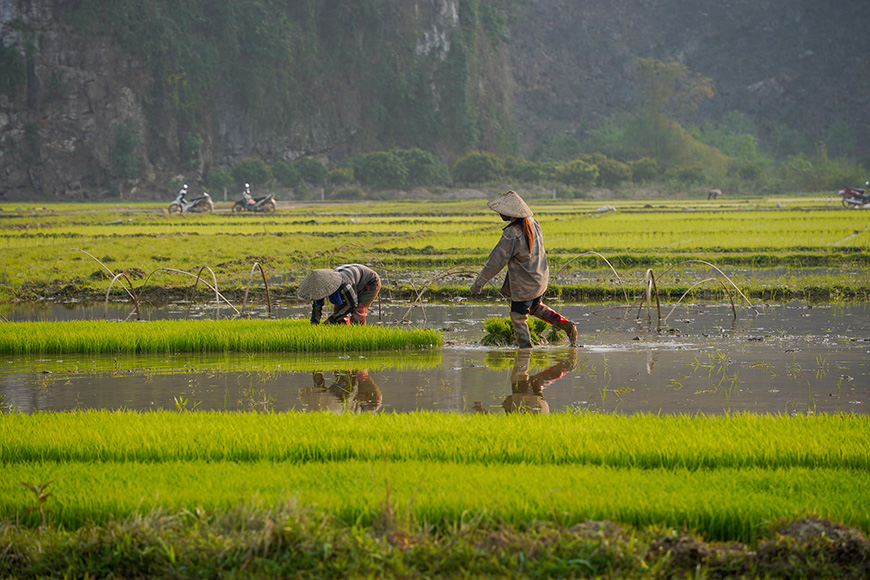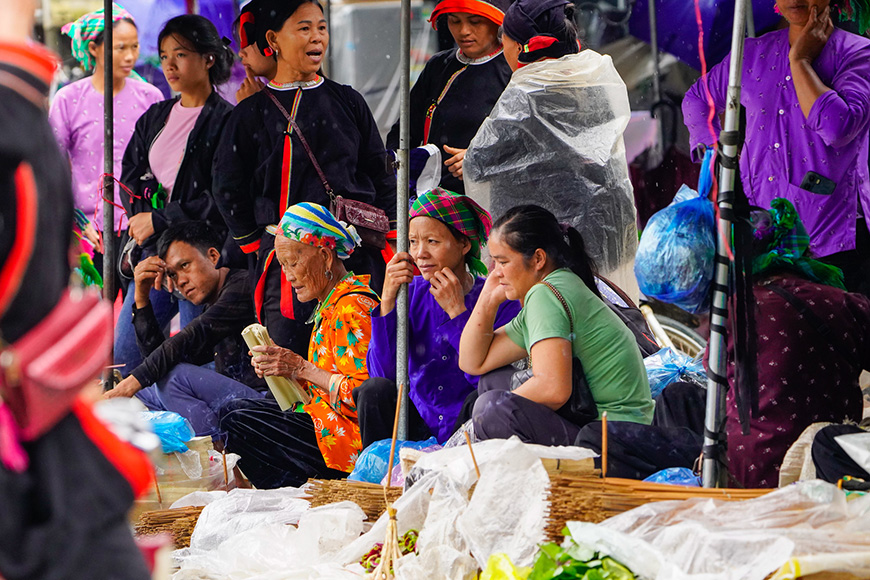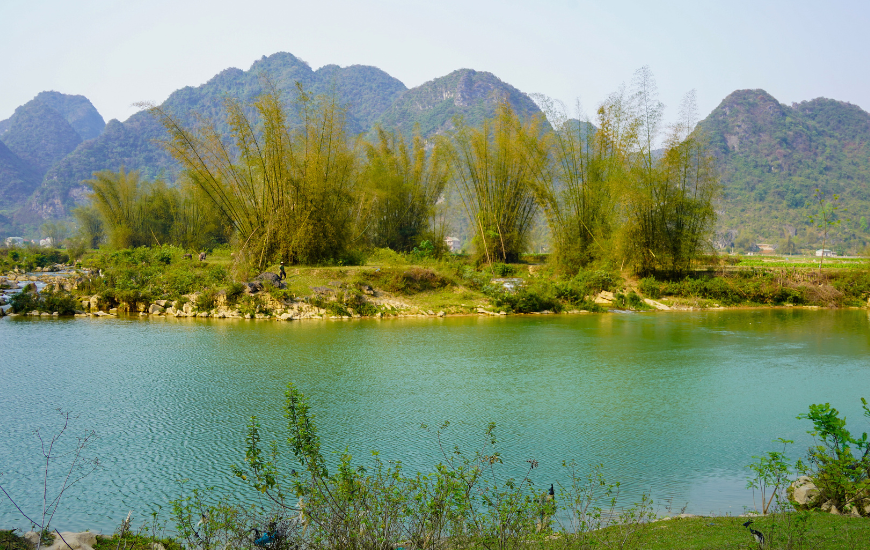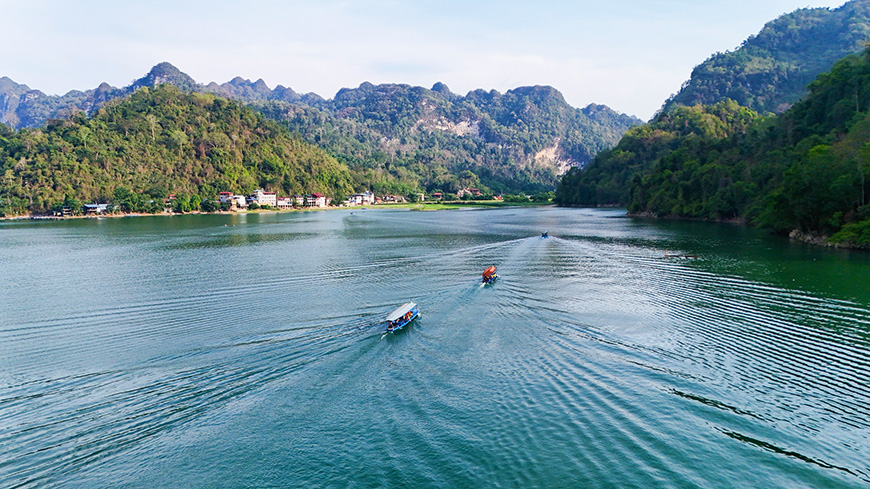The subtle art of ethical micro-adventure
The eternal, authentic Vietnam sparks dreams. However, the quest for "authenticity" too often leads to crowds. Responsible travelers seek alternatives to Sapa and look for how to travel ethically in Tonkin (Northern Vietnam).The answer lies in micro-adventure: a model of slow, deep exploration focused on supporting local communities in the Northeast. Forget the race to see cliché, over-frequented "must-sees". Prioritize ethical travel: choose a single region, settle in for a stay of at least 2 or 3 days, and spend locally to sustainably support the economy.
 Micro-adventure is experiencing slow travel - Here in Lang Son Province | Mr Linh's Adventures
Micro-adventure is experiencing slow travel - Here in Lang Son Province | Mr Linh's AdventuresThe slow travel manifesto: an antidote to overtourism
The beauty of Northern Vietnam, with its
terraced rice fields and
stilt houses, relies on a fragile balance. The problem of
overtourism in Vietnam is resource depletion and the standardization—or even
cultural dilution—of the experience.
When thousands of people visit the same site in one day (like Sapa or Mu Cang Chai), the economic benefits no longer go to local farmers and artisans but to large hotel chains and outside investors, leaving the local communities with only pollution. So, what is sustainable tourism in Vietnam? It's not just about recycling your bottles; it's also about
rethinking the itinerary.
This is where
micro-adventure comes in, proposing an antidote: instead of seeing the North as a postcard to collect, we invite you to choose
small,
specific areas—often in the lesser-visited Northeast (Cao Bang, Lang Son, or the Ba Be Lake region)—and stay there for at least three nights. These regions have less developed infrastructure and wilder nature, where tourism remains largely managed by local communities.
 Slow stays to directly support local communities | Mr Linh's Adventures
Slow stays to directly support local communities | Mr Linh's AdventuresA moral contract
By venturing into isolated valleys rather than famous transit towns, you answer the question of how to truly get off the beaten path. The contract is simple:
♦ Support the locals: By prioritizing accommodation for three consecutive nights in the same homestay.
♦ Fair compensation: Your money directly benefits the family or cooperative, and not a distant intermediary.
♦ Real immersion: Staying longer allows you to establish a relationship, perhaps learn a few words of the Tày or H'mong language, and move beyond the simple status of observer.
 Cao Bang, beyond Ban Gio waterfalls | Mr Linh's Adventures
Cao Bang, beyond Ban Gio waterfalls | Mr Linh's AdventuresThree destinations for an ethical micro-adventure
The Northeast, Vietnam's border region, is a mosaic of geological parks and secret valleys, perfect for slow travel.
Cao Bang: Exploring the Geopark, beyond Ban Gioc
Cao Bang province is globally known for the spectacular
Ban Gioc waterfall. But the secret of this endearing province lies in its immense
Non Nuoc UNESCO Global Geopark, a perfect playground for slow exploration.
How to travel ethically in Cao Bang?
Instead of a quick round trip to the waterfall, commit to three days. By staying in a traditional Tày homestay, you ensure your spending directly benefits the family, promoting the sustainability of their way of life. Use this time to hire the services of a local guide and explore Thang Hen Lake, for example. A stone's throw from Detian Falls (Détiān Pùbù, the Chinese name for Ban Gioc), the famous Nguom Ngao Cave (Tiger Cave) is a frequent stop. To avoid the afternoon crowds, plan a very early morning visit. For the more adventurous, hire a certified local guide through your homestay to explore one of the alternative entrances or unmarked sections of the cave (Nguom Lom, Ban Thuon, for instance).
Mr. Linh's nod: Ask your host to show you the making of authentic Dó paper. This simple moment of sharing is far more valuable than a quick tour.
 Ba Be Jungle Houses, your Jungle Resort in Ba Be National Park | Mr Linh's Adventures
Ba Be Jungle Houses, your Jungle Resort in Ba Be National Park | Mr Linh's Adventures Ba Be lake: Experiencing community ecotourism
Ba Be lake (located in the former Bac Kan province, now attached to Thai Nguyen) is a must-see for Vietnamese ecotourism. It is a freshwater lake set in lush biodiversity and managed by the Tày communities.
What's the best way to explore Ba Be Lake?
Slowness is key. Stay in the village of Pac Ngoi, or in the
Ba Be Jungle Houses Jungle Resort, and prioritize slow, silent navigation on the lake's arms. Avoid mass excursions and opt for boat rides with local boatmen, committing to leaving no trash behind. By staying at least two nights, you actively participate in the economy of a protected site and finance the preservation of its fragile ecosystem. Nature lovers can also participate in night safaris, for a total and captivating immersion in the secret life of the jungle.
(1).png) Bac Son valley, the true gem of Lang Son Provice | Mr Linh's Adventures
Bac Son valley, the true gem of Lang Son Provice | Mr Linh's AdventuresThe Bac Son valley: The luxury of slow travel by bicycle
If you are looking for quiet rice fields, the Bac Son valley (Lang Son province) is a discreet and captivating alternative. Tourism here is in its early stages, so you have the power to shape its future development.
How to be a responsible traveler in Bac Son?
The ideal transport is the bicycle or walking. By staying in a Tày stilt house, you directly support the local architectural heritage. Your goal here is to integrate: help prepare meals, assist with tea picking, or admire the changing light on the rice fields from the village viewpoints.
.png) Micro-Adventure is about rethinking the itinerary | Mr Linh's Adventures
Micro-Adventure is about rethinking the itinerary | Mr Linh's AdventuresThe traveler's contract: zero waste, maximum impact
Every micro-adventurer must respect three commitments, especially in rural areas without effective recycling systems:
✓ Zero plastic goal: Plastic pollution is the bane of isolated areas. Always bring a reusable water bottle and systematically refuse straws, disposable bags, and small water bottles. In the North - but also throughout the Country of Two Deltas - your waste is their pollution.
✓ Ethical and fair purchasing: When you buy crafts (embroidery, fabrics), ask how much it costs the local artisan. Pay a fair price and avoid aggressive bargaining. Your purchase must be an investment in culture and not a cheap souvenir.
✓ Cultural respect: Minority ethnic groups are not objects of curiosity. Ask permission before taking close-up photos and learn a few polite words. Respect and discretion are the true passport to authenticity.
 Ba Be lake, true piece of paradise in Ba Be National Park | Mr Linh's Adventures
Ba Be lake, true piece of paradise in Ba Be National Park | Mr Linh's AdventuresDo less to receive more
Traveling by micro-adventure is choosing to do less to receive more. It's a way of traveling as a partner of the host community, ensuring that the beauty of Northern Vietnam remains intact.
Are you ready to trade the race for the true luxury of slow travel?